The daily plenary sessions feature some of the world’s most distinguished HIV scientists, policy specialists, and community leaders. Plenary sessions bring all conference delegates together at the first session of every morning.
This is not the complete list of plenary speakers. Additional plenary speakers are being confirmed and will be announced soon. Please note that this is the list of confirmed plenaries, additional speakers, presentation titles and the programme are subject to change.
Tuesday, 24 July 2018 – Breaking barriers of inequity in the HIV response

The epidemiology and vulnerability of missing and indigenous populations
Stefan Baral, United States
Stefan Baral is a Physician Epidemiologist and Associate Professor in the Department of Epidemiology at the Johns Hopkins School of Public Health. He trained in community medicine at the University of Toronto as a Fellow of the Royal College of Physicians and Surgeons of Canada, and Family Medicine with the Canadian Council of Family Physicians.
As Director of the Key Populations Program in the Center for Public Health and Human Rights, Stefan works to understand why people continue to be at risk for acquiring and transmitting HIV. He looks particularly at the interactions of structural and network-level determinants with individual-level proximal risks for HIV infection. With colleagues, Stefan focuses on using available scientific tools to characterize the distribution of HIV risks, including in countries with broadly generalized HIV epidemics. This has included studying the burden of HIV and HIV-related vulnerabilities among gay, bisexual and other men who have sex with men, transgender women, people who use drugs, and sex workers in a range of HIV epidemic settings. Stefan has participated in advancing the standardization of methods and measures in HIV-related implementation research to study how best to implement programmes serving marginalized communities. Stefan’s work is guided by the hypotheses that HIV is not Zika and the world is more similar than it is different.
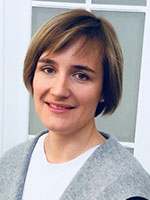
Exploring innovation around HIV and substance use
Anna Deryabina, Kazakhstan
Anna Deryabina is a Regional Director for Central Asia at ICAP, Columbia University. Here, she manages a PEPFAR/CDC-funded project that works closely with ministries of health and local healthcare providers to improve HIV prevention and treatment programmes and strengthen strategic information systems in Kazakhstan, Kyrgyzstan and Tajikistan. She also serves as a technical lead on a CDC-funded infection prevention and control project in Georgia.
Anna is a medical doctor trained in internal medicine. She also holds a doctorate degree in public health focused on health policy and management. Her areas of professional interests include HIV programming for key populations, monitoring and evaluation, quality improvement and health system strengthening.
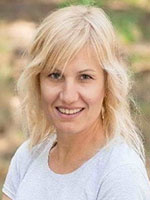
Olena Stryzhak, Ukraine
Olena Stryzhak has been living with HIV for 17 years. She is a representative of the community of women who use drugs and represents the Eastern Europe and Central Asia region in the International Community Women Living with HIV. Olena is a founder of the Eurasian Women’s Network on AIDS and the head of the Cherkasy division of the Network of PLHIV, Ukraine. Olena was a speaker at AIDS 2006, AIDS 2008, AIDS 2010, AIDS 2012 and AIDS 2016. Her team was awarded the Red Ribbon Award when she spoke at the Global Village in AIDS 2014. Olena also chairs the Board of the charitable organization, Positive Women Network, in Ukraine.
In 2000, the thought of getting involved in social activism had not crossed her mind. She was 21 years old, pregnant and starting at a trade firm after graduating from college. Then, at a routine pregnancy check up, she learned that she was HIV positive. As there was no antiretroviral treatment in Ukraine then, doctors advised pregnant HIV-positive women to abort. Olena decided to keep her baby. A year after delivering her baby, psychologists from the AIDS centre suggested that she create a support group. A few months later, she met a team from the All Ukrainian Network of People Living with HIV/AIDS and started working with them, becoming head of the Cherkasy regional branch of the network in 2004. “I wanted to give women inspiration, to make them know about their rights and help them gain confidence and motivation,” Olena explains.

Courage in leadership: National leadership toward human rights in the HIV response
Maneesh Gobin, Mauritius
Maneesh Gobin, MP, has more than 15 years’ standing at the Bar of Mauritius. He has extensive experience in the legal and judicial service of Mauritius, working in various capacities from 1999 to 2008. These include being State Counsel/Senior State Counsel and, District Magistrate/Senior District Magistrate. He also gained significant experience of electoral laws and practices as Returning Officer for national and local government elections in Mauritius, as well as working as an African Union election observer. He is a staunch supporter of social justice policies.
Wednesday, 25 July 2018 – Building bridges from scientific innovation to implementation
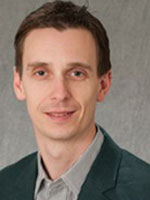
The newest science in the search for a cure and vaccine
Brad Jones, United States
Brad Jones joined George Washington University in May 2015 as Assistant Professor in the Department of Microbiology, Immunology and Tropical Medicine. He received his PhD in immunology from the University of Toronto, where he studied the cellular immune response to HIV infection, and continued this work as a postdoctoral fellow at the Ragon Institute of the Massachusetts General Hospital, Massachusetts Institute of Technology and Harvard.
His current research is focused on understanding how to maximally harness the “cytotoxic T-cell” arm of the immune system to contribute to the elimination of the HIV reservoirs that persist in individuals on long-term therapy, and thus to inform efforts to cure infection. This work is conducted primarily in the context of the NIH-funded Martin Delaney “BELIEVE” collaboratory, for which Brad serves as an Executive Committee member.
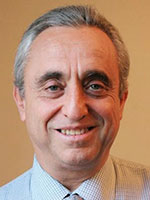
ART 2018 – Moving into the integrase era
Pedro Cahn, Argentina
Pedro Cahn has been working on infectious diseases for 40 years and has been involved in the HIV/AIDS arena since 1982. He is Professor of Infectious Diseases at the Buenos Aires University Medical School. He has served as Chief of Infectious Diseases at the Juan Fernandez Hospital in Buenos Aires, Argentina, where he is now Senior Consultant. And he is Scientific Director at Fundación Huésped, the largest NGO in Argentina, serving patients with and at risk of HIV/AIDS. Pedro’s team has contributed to identifying new treatment strategies, in particular promoting research on dual therapy.
Pedro, a Past President of the International AIDS Society, is Co-Chair of CCASANET, the Caribbean, Central and South America network, a cohort part of the International Epidemiologic Databases to Evaluate AIDS (IeDEA) and investigator with the International Maternal Pediatric Adolescent AIDS Clinical Trials (IMPAACT) network. He has served as external advisor for UNAIDS, the World Health Organization (WHO), the Pan-American Health Organization (PAHO), UNITAID and Doctors without Borders. He is as a member of the WHO antiretroviral guidelines panel, Chair of the Treatment Advisory Group at PAHO and a former member of the guidelines panel of the International Antiviral Society-USA. He is part of the Technical Advisory Committee on HIV at the National AIDS Program in Argentina. He has served as external advisor for ARV guidelines panels in Mexico, South Africa and Uruguay. Pedro has published more than 200 peer-reviewed papers and book chapters.
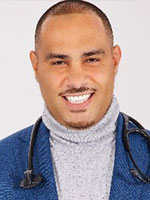
Making the treatment cascade work in vulnerable and key populations
David Malebranche, United States
David J Malebranche is a board-certified internal medicine physician and expert in men’s and LGBT health, as well as the prevention and treatment of HIV and sexually transmitted infections. He is an Associate Professor of Medicine at Morehouse School of Medicine in Atlanta, Georgia, and is an experienced qualitative HIV behavioural prevention researcher who has completed several studies on sexual health among black men of diverse sexualities.
David has published more than 40 articles in leading medical and public health journals. He is known as a dynamic speaker worldwide and has appeared in documentaries on CNN, ABC News Primetime, TV One and Black Entertainment Television for his expertise on HIV in the black community. David served as a member of the President’s Advisory Council on HIV/AIDS (PACHA) from 2006 to 2008 and as the HIV/AIDS clinical expert on WebMD from 2010 to 2012. He also appears in the video series, #AsktheHIVDoc, which promotes education on sexual health topics for same gender-loving men. In 2015, he published his first book, a memoir about his father entitled Standing on His Shoulders.
Thursday, 26 July 2018 – Breaking barriers and building bridges between our responses toward universal health
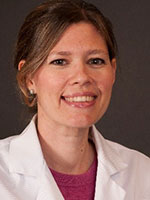
Understanding the intersecting syndemics of communicable and non-communicable diseases
Emily Hyle, United States
Emily Hyle is a Clinician-Investigator in the Division of Infectious Diseases at the Massachusetts General Hospital and Assistant Professor of Medicine at Harvard Medical School. She attended the University of Pennsylvania School of Medicine and completed her clinical training and chief residency at the Massachusetts General Hospital with additional training in epidemiology at the Harvard T.H. Chan School of Public Health. As a member of the Cost-effectiveness of Preventing AIDS Complications (CEPAC) research team, her research focuses on using simulation modelling and cost-effectiveness analysis to investigate clinical and public health interventions for people with HIV.
Funded by the National Institutes of Health (NIH), Emily has led and contributed to model-based analyses that include studies on HIV and non-communicable comorbidities, HIV drug resistance, laboratory monitoring, point-of-care testing and loss to follow up. Her research is cited in the US Department for Health and Human Services Guidelines for the Use of Antiretroviral Agents in HIV-1-Infected Adults and Adolescents, as well as the World Health Organization (WHO) Consolidated guidelines on the use of antiretroviral drugs for treating and preventing HIV infection. She was a member of the Guidelines Development Group for the WHO public health response to HIV drug resistance, and has been an invited speaker at the NIH and WHO on issues regarding resource utilization and cost effectiveness. As a practicing physician, she provides clinical care for people with HIV and other infectious diseases.
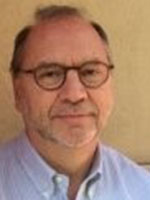
Global health and the HIV response
Peter Piot, United Kingdom
Peter Piot is the Director of the London School of Hygiene & Tropical Medicine, and the Handa Professor of Global Health. He was the founding Executive Director of UNAIDS and Under-Secretary-General of the United Nations (1995-2008).
A clinician and microbiologist by training, he co-discovered the Ebola virus in Zaire in 1976, and subsequently led pioneering research on HIV/AIDS, women’s health and infectious diseases in Africa. He has held academic positions at: the Institute of Tropical Medicine, Antwerp; the University of Nairobi; the University of Washington, Seattle; Imperial College London; and the College de France, Paris. He was a Senior Fellow at the Bill & Melinda Gates Foundation. He is a member of the US National Academy of Medicine, the National Academy of Medicine of France, and the Royal Academy of Medicine of his native Belgium, and a Fellow of the UK Academy of Medical Sciences and the Royal College of Physicians.

Leaving no one behind: A call to action
Yana Panfilova, Ukraine
Yana Panfilova heads the Board of Teenergizer, a union of adolescents and youth in Ukraine, and is a member of the Steering Committee of the Global Network of Young People living with HIV (Y+). Yana is the author of report, Key barriers to HIV testing for adolescents in EECA (Ukraine, Russia and Georgia).
Yana was born with HIV. “When I was 10, I discovered my HIV status,” she says. At 13, she spoke at the international Children and HIV conference on behalf of adolescents living with HIV in Eastern Europe and Central Asia. She says that as a result of her advocacy and speaking openly about her HIV status, the Ukraine Ministry of Health introduced disability benefits for HIV-positive children in June 2013. She also spoke at the expanded meeting of the Coordinating Committee of HIV Prevention in the Sverdlovsk region in Russia in December 2013. Shortly after this, the government took a decision that its structures would pay special attention to youth living with HIV.
Friday, 27 July 2018 – Building bridges for the next generation
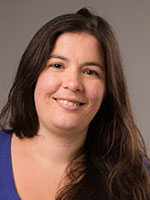
Understanding adolescent neurocognitive development in the context of HIV treatment, prevention and care
Anne-Lise Goddings, United Kingdom
Anne-Lise Goddings is a Clinical Lecturer at the University College London (UCL) Great Ormond Street Institute of Child Health in London, UK. She completed her medical degree at Cambridge University and UCL, and specialized in paediatric medicine in London where her interest in adolescent cognitive neuroscience originated from working with adolescents in a variety of clinical settings.
In 2015, Anne-Lise completed her PhD exploring how the hormonal and physical changes of puberty are associated with the developing structure and function of the human brain during adolescence, working with UCL Professors Sarah-Jayne Blakemore and Russell Viner. Her research focuses on how developmental changes in the brain during adolescence are related to behaviours that commonly emerge at this time, including decision making, risk taking and emotion processing; it uses a combination of behavioural, biological and magnetic resonance imaging methods. Anne-Lise has collaborated with research groups around the world and has published a series of peer-reviewed articles and book chapters on her research. She continues to work as a clinician alongside her research, the goal of which is to improve our understanding of the impact of illness and disease on the developing adolescent brain.

Growing into leadership for an efficient HIV response
Romesa Roy William, Pakistan
Romesa Roy William is a proud Pakistani transwomen, rights activist and HIV advocacy officer. She explains that she was born in Karachi in 1992 with male genital parts. “After my transition into another gender, I am still struggling to get a female identity due to the Islamic religious influence in our country and social norms.” At school, she was often told that she was “a feminine boy” and “homo/gay”. “I started studying gender identity and sexuality to better understand what I am.” She also obtained a Bachelor’s degree in business administration from Biztek University Karachi and a certificate in fashion design.
In 2012, Romesa joined the community-based Parwaz Male Health Society, established by the NAZ Male Health Alliance, which promotes HIV prevention and welfare of sexual minorities. While working there, she attended a meeting held by HIV Young Leader Funds (HYLF) and the 11th International Congress on AIDS in Asia and Pacific (ICAAP) in Bangkok, Thailand. This fuelled her “activism spark … in a closed society like Pakistan where each year the cases of suicide and murder of sexual minorities and key affected population is increasing”. She appeared on national and international platforms, representing the Pakistani transgender community. Romesa was selected as an IAS Youth Ambassador and represented Pakistan at the International AIDS Conference in Durban, South Africa, in 2016. The following year, she joined the Sindh Transgender Network as an HIV Advocacy Officer.
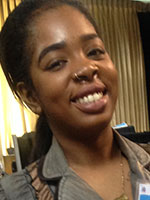
O’Cindy Cynthia Samuels, Guyana
O’Cindy Cynthia Samuels, 24, is a Youth Ambassador from Guyana and a Field Officer working with the Guyana Sex Work Coalition. She was born in rural Berbice and grew up in Georgetown, the capital of Guyana. O’Cindy completed secondary school in 2012 and plans to study law. Meanwhile, she works with youth on advocacy to end AIDS.
“Due to my experience growing up and turning to sex work to better the life of my mom and younger siblings, I decided to share my experience and dedicate my time to helping youths, to guide them because our youths are so caught up with technology,” she says. “It’s like the future is dying and the world will end as they say the children are the future.”
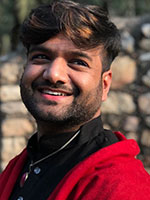
Gautam Yadav, India
Gautam Yadav from India identifies as gay and “living positively with HIV”. He has dedicated himself to working hard for the establishment of an identity for LGBTQ communities. Gautam has served on the Board of the UNAIDS Youth Advisory Forum in Asia Pacific, and is a working core committee member of Youth Voices Count in Bangkok, Thailand.
Gautam is now working as Program Officer with The Humsafar Trust in Delhi. He is a Board member for Youth Lead in Bangkok, a key correspondent member of the International HIV/AIDS Alliance in Britain, a Steering Committee member of the Young People Living with HIV (Y+) Initiative of the Global Network of People Living with HIV in Amsterdam, and a Steering Committee member of the Men who have Sex with Men Global Forum (MSMGF).


 ПОИСК ПО САЙТУ
ПОИСК ПО САЙТУ  поиск по ресурсному центру
поиск по ресурсному центру 



